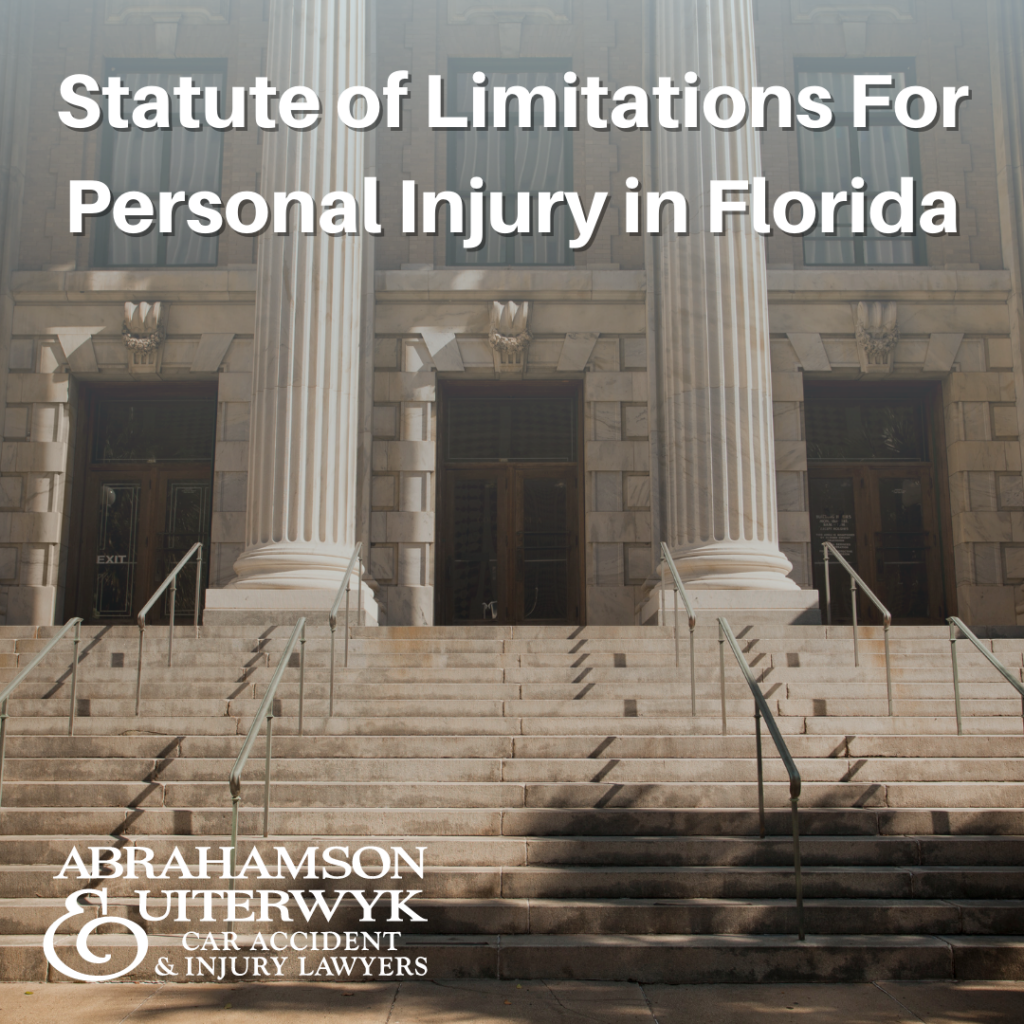How Long Do I Have to File a Personal Injury Claim in Florida?

How long you have to file a personal injury claim in Florida, depends on the statute of limitations for that specific case type. Depending on the type of claim, as stated in Florida Section 95.11, the time you have to file a personal injury claim usually ranges from 2 to 5 years after the incident.
When someone suffers severe injuries, the consequences can be enormous. These injuries are life-changing, often resulting in expensive medical bills, property damage, loss of income, and other hardships.
If someone else is at fault for your injuries, you shouldn’t have to bear these costs. Once an injury occurs, time is of the essence in bringing your case to court.
That’s because, like all states, Florida has a statute of limitations for personal injury claims. According to Nolo, a “statute of limitations is a state law that sets a strict time limit on your right to file a personal injury lawsuit”.
What is The Personal Injury Statute of Limitations in Florida?
As per section 95.11 of the Florida Statute of Limitations, the personal injury statute of limitations in Florida typically ranges from 2-5 years from the date of your injury depending on the claim type. Here’s how the following list breaks down the statute of limitations for each of our practice areas.
Florida Statute of Limitations for:
What Does “Statute of Limitations” Mean?
A statute of limitations is sort of like an expiration date on when a lawsuit can be brought. The statute of limitations is a law that sets the maximum amount of time you have to pursue a legal claim after an incident. If you do not file your case before the statute of limitations expires, your claim will be forever barred. The statute of limitations is different depending on the state and the type of case.
Why Does Florida Have a Statute of Limitations?
The purpose of the personal injury statute of limitations in Florida, is to make sure that parties bring their cases to court on time. In this way, potential defendants don’t have to worry about litigating something that happened decades ago.
Imposing a time limit also ensures that important evidence isn’t lost over time, which is good for each party. The time limit just has to be “reasonable,” which is why the statute of limitations is different in each state.
Understanding the Florida PIP Statute of Limitations
The Florida PIP statute of limitations refers to the time limit within which you must file a claim for Personal Injury Protection (PIP) benefits under Florida’s no-fault insurance system. What does PIP insurance cover? In Florida, PIP benefits are designed to cover medical expenses, lost wages, and other costs associated with an accident, regardless of who was at fault.
Under the law, you generally have 14 days from the date of the accident to seek medical treatment in order to qualify for PIP benefits. If you do not seek medical attention within this time frame, you may lose your eligibility for coverage.
Since a PIP claim arises from your insurance policy, the contract statute of limitations applies which provides that an action must be brought within 5 years of the date the contract is breached. This means that you typically have 5 years to sue if your PIP benefits are denied or there is a dispute over the coverage. However, it’s crucial to address any issues related to your PIP coverage as soon as possible, as waiting too long may impact your ability to recover the benefits you are entitled to.
If you are involved in an accident, it’s important to consult with an attorney who is familiar with Florida’s no-fault laws to ensure your claim is filed within the appropriate time frames.
What are the Florida Statute of Limitations in Personal Injury Case Types?
- Automobile Accidents – Someone who suffers injuries in a car, truck, or motorcycle accident may have multiple options in bringing their case. The Florida bodily injury statute of limitations for car accidents depends on who is at fault and whether the accident resulted in death. Injury lawsuits against another driver have various deadlines. If another driver is at fault for carelessly injuring someone, the injured person has 2 years to file a lawsuit.
However, if you have a claim against an uninsured motorist that timeframe might be extended to 5 years. Also, there are tricky deadlines within which you must utilize your Florida PIP statute of limitations coverage (no-fault benefits) and these deadlines can be as short as 14 days.
If a person is claiming that another driver damaged their car, they have 2 years to bring Property damage lawsuits.
- Motorcycle Accidents – For motorcycle accidents, the Florida bodily injury statute of limitations is two years for personal injury claims. In the event that a Florida motorcycle accident results in death, the law allows two years from the date of death to file a lawsuit.
- Bike Accidents and Pedestrian Accidents – For bike and pedestrian lawsuits, the injured party has two years to bring suit against the person or organization that causes the accident. If the accident results in death, the statute of limitations is two years. If there is a case against an uninsured motorist insurer, the statute of limitations may be extended to five years. Finally, limitations apply to PIP (no fault) claims that can be as little as 14 days.
- Slip and Fall Injuries – For slip and fall injury lawsuits, the statute of limitations is two years for bodily injury claims. For death claims, the limitation period is two years.
- Wrongful Death – If a loved one dies in an accident, the family has two years from the date of death to bring a wrongful death lawsuit.
- Medical Malpractice – The statute of limitations for medical malpractice is complicated in Florida. It generally runs two years from the date when you knew or in the exercise of reasonable diligence should have known that the injury was caused by medical malpractice. Florida also has another law, called the “statute of repose”, which sets an outer time limit of four years regardless of when you knew or should have known of the malpractice.
The statute of repose begins to run on the date that the malpractice occurs. It is important to remember that the two-year statute of limitations will cut off a claim if you knew or should have known of the malpractice even though the four-year repose period may not have expired.
There are two exceptions to the rules above. The first exception applies where the healthcare provider commits fraud, misrepresentation or concealment of the malpractice. In these rare cases, the statute of repose is extended to seven years. In such a case, the two-year statute of limitations still runs from when you knew or should have known of the malpractice. If the statute of limitations runs before you file your claim, even if the repose period has not expired, you will be barred.
The second exception involves claims for children. The law says that the ordinary statute of repose will not cut off a child’s claim before the child’s eighth birthday. Again, however, the two-year statute of limitations is not extended and will cut off a claim two years after the child’s parent or guardian knows or should know of the malpractice.
The statute of limitations for medical malpractice cases is extremely complex, if you feel you have a medical malpractice case you should definitely consult an experienced attorney near you to protect your legal rights.
- Nursing Home Abuse – The statute of limitations for nursing home abuse is essentially the same as the statute governing medical malpractice. The only differences are that the repose period for cases involving fraud and misrepresentation is six years instead of seven and the rules for cases involving children do not apply.
- Dog Bites – When a dog bites or injures someone, the statute of limitations in a dog-related injury lawsuit is four years in cases against the owner of the dog. Any negligence case against parties other than the dog’s owner, however, is subject to a two-year statute of limitation. If the incident results in death, the period is two years.
- Construction Accidents – A worker may be suing someone other than their employer in a construction accident lawsuit. In this case, the statute of limitations for injuries is two years. If the worker died, the family has two years to bring suit.
- Products Liability – If a person sustains injuries from a defective product, they have two years to bring product liability lawsuits. If the defective product causes death, the statute of limitations is also two years.
- Other Types of Cases – There are many other types of cases, such as claims against governmental entities, worker’s compensation claims, and boating accident claims, which are subject to statutes of limitations and other deadlines. It is critical that you obtain competent counsel as soon as possible if you have been involved in any of these accidents.
Are There Any Reasons to Take Action if I Have Plenty of Time Left on the Statute of Limitations?
Yes. The statute of limitations is the legal deadline within which a lawsuit must be filed. There are many things that need to occur before a lawsuit is filed. Additionally, it is advantageous to take certain action immediately after the accident to avoid diminishing the value of your claim. For example, evidence can get misplaced or destroyed. Also, witnesses can be difficult to locate, and their memories and recollection can change over time. Therefore, it is best to take quick action and get immediate legal representation. Contact an experienced statute of limitations personal injury lawyer near you.

Is There Any Advantage in Getting an Attorney Immediately After the Accident?
Yes. Our experience is that injured clients are best served if they know their legal options at the beginning of the case. As stated above, initiating the investigation immediately helps in developing evidence and witnesses’ testimony while the events are still fresh in their minds. Also, it is commonly very helpful to injured victims to know the amount of insurance available, if any. Our firm works diligently to obtain this information at the outset.
Are There Any Risks in Talking to the Insurance Company, Even if There is Plenty of Time on the Statute of Limitation?
Yes. Insurance companies are not looking out for injured victims’ interests. They are trying to minimize the payout of insurance compensation to injured victims. Commonly insurance companies will want to record conversations and many times take in-depth recorded statements. Also, they have complex paperwork which may include medical authorizations and releases of liability. These communications with the insurance companies can be quite damaging to the value of and the ability to pursue an injury claim.
How Can I Make Sure the Statute of Limitations Hasn’t Run Out on My Personal Injury Claim?
Figuring out which statute of limitations applies to your case can be complicated. Additionally, you might not know who is at fault, which can change how much time you have to file suit. Here’s how to make sure you have time to assert your rights, and that is by contacting an experienced statute of limitations Florida personal injury attorney. At Abrahamson & Uiterwyk, we can help answer your questions. To speak with our nearby experienced Tampa Bay personal injury attorneys, schedule a free consultation online or call us at 1-800-538-4878.
To learn more about Camp Lejeune claims read this article.
What Our Clients Say
“Everything was professional and done very well and quick. I am very satisfied with my experience and thank the firm for all the hard work they did for me.”
Allen W.
Rating 5/5 ⭐⭐⭐⭐⭐
See our 4.9 rating and read more of our 323 reviews on Google!

